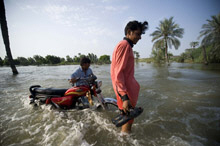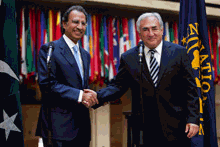
Typical street scene in Santa Ana, El Salvador. (Photo: iStock)
IMF Survey: IMF to Provide $450 Million in Flood Aid to Pakistan
September 2, 2010
- Floods will have significant economic impact
- IMF funds to support the authorities’ emergency response
- Dialogue with IMF continues on existing $11 billion program
The IMF announced it would provide around $450 million in new emergency financing to Pakistan to help the country cope with the economic impact of this summer’s massive floods, which have affected about one-fifth of Pakistan’s land mass and left millions homeless.

Flooding in Muzaffargarh, Pakistan: The disaster will severely impact the country’s economic outlook, the IMF says (photo: AFP/Pedro Ugarte)
ASSISTANCE FOR PAKISTAN
“This natural disaster will have an important effect on the country’s economy. It has caused serious damage to the country’s infrastructure, severely impacted its economic outlook, and resulted in a worsening of the fiscal situation,” said IMF Managing Director Dominique Strauss-Kahn. “In response to this, I will ask the IMF Board to approve $450 million in emergency assistance to be made available this month.”
The emergency financing, which is subject to approval by the IMF’s Executive Board, would be provided under the IMF’s policy for Emergency Natural Disaster Assistance (see box). The funds are expected to be disbursed later this month.
Urgent funding needs
IMF Survey online spoke to the IMF’s Pakistan mission chief, Adnan Mazarei, about the Emergency Natural Disaster Assistance (ENDA).
What does Pakistan need right now?
MAZAREI: The priority is immediate assistance to deal with the urgent humanitarian needs.
What is the significance of the $450 million ENDA assistance?
MAZAREI: As the Managing Director and the Minister of Finance for Pakistan explained in their press statements, the ENDA disbursement is fast, nonconditional, and additional to the existing Fund-supported program.
When will the disbursement be made?
MAZAREI: The emergency assistance can be disbursed on the approval of the Executive Board, which is expected within a couple of weeks.
Would the assistance lead to any reduction in other Fund disbursements?
MAZAREI: No. The ENDA will not lead to a reduction in our large assistance program for Pakistan. The next disbursement under the Stand-By Arrangement is about $1.7 billion on the completion of the fifth review, which is expected before the end of this year.
Will the fifth review provide for more flexibility in the overall program?
MAZAREI: Yes. The authorities’ macroeconomic program under the Stand-By Arrangement is being adjusted to take into account the additional expenditure required to deal with this humanitarian disaster. The money for this will come from our new emergency assistance as well as from other multilateral and bilateral assistance.
Assessing the cost
A Pakistani delegation, led by Finance Minister Abdul Hafeez Shaikh, met with IMF staff and management in Washington during the past week to discuss the disaster’s implications for the country’s budget and longer-term growth targets. The IMF says it will continue to support Pakistan’s economy under the $11 billion loan program that was initially agreed in November 2008.
“Our dialogue with Pakistan on the current Stand-By Arrangement is progressing and the authorities have expressed their intention to implement measures for the completion of the fifth review of the program later this year. We will stay in close contact as these efforts proceed. Completion of the fifth review will allow the Fund to disburse an additional $1.7 billion, bringing total IMF disbursements (including emergency assistance) to $2.2 billion in the second half of 2010,” Strauss-Kahn said.
Given the disaster’s impact, however, some of the parameters of the existing program may need to be changed, according to Masood Ahmed, Director of the IMF’s Middle East and Central Asia Department.
“The economic impact is going to be very significant,” Ahmed said, noting in particular the floods’ devastating effect on agriculture. “The floods will lower growth and will affect the government’s budget because they will have to spend more and they’ll be able to raise less revenue. And Pakistan will have massive reconstruction costs down the road running into the billions of dollars.”
“Qualitatively different”
At a press conference following the announcement of IMF assistance, Finance Minister Shaikh said that the country had received pledges of aid from a variety of sources, including a United Nations appeal of $460 million, a combined commitment of $3 billion from the World Bank and the Asian Development Bank, and varying amounts from bilateral donors. But he noted that the IMF’s emergency assistance was “particularly relevant” for Pakistan’s situation.
“The IMF disbursement is qualitatively different in that it is a clear additionality—it is not simply a recycling of existing money,” Shaikh said. “And second, it will be disbursed in a matter of weeks, rather than in an unspecified period of time.”

IMF’s Dominique Strauss-Kahn (r) with
Pakistan’s Finance Minister Abdul Hafeez
Shaikh at IMF headquarters in Washington
September 2
(IMF photo)
Shaikh also noted that the IMF disbursement would be targeted to actions to help the most vulnerable. “Even at this time, as we undertake economic reforms which can bring hardship, we will continue with targeted programs for protecting the poor.”
Strauss-Kahn told the press that the IMF’s work with the Pakistani government would take two main directions—to provide immediate assistance and to deal with the medium-term economic consequences of recent events. But the most important things, he stressed, were to put the Pakistani economy back on track and ensure the poor and vulnerable are protected.
The IMF-supported program had been making good progress before the floods to lay the basis for high growth and continue poverty reduction, Strauss-Kahn said. “I am very happy to hear from the minister that the Pakistani authorities clearly have in mind to do so.” Implementing the necessary economic reforms would provide a signal for the international community to mobilize resources for the country, he added.
Discussions on Pakistan’s macroeconomic framework will continue in the coming weeks.
The World Bank and the Asian Development Bank are currently conducting a damage and needs assessment in the flood-hit areas. Preliminary information indicates that direct damage from the floods is greatest in the housing, roads, irrigation, and agriculture, with crop loss estimated at $1 billion, according to the World Bank. However, the full impact on soil erosion and agriculture cannot be assessed until the water recedes.


